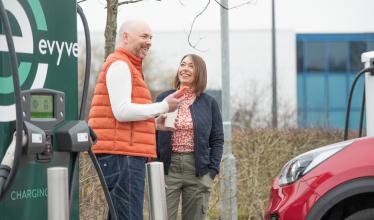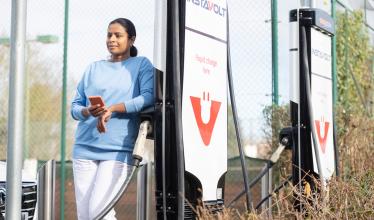EV energy tariffs
Charging at home is a crucial part of ownership for most electric vehicle (EV) drivers. Indeed, you may already be familiar with the convenience of plugging in overnight and waking up to find a fully charged car in the morning.
However, whilst home charging is typically much cheaper than petrol, diesel or public charging, it does mean that your electricity bills will increase. This prompts many EV drivers to look at ways to maximise their savings.

Home energy EV rates
To meet this demand, a number of energy companies offer EV energy tariffs tailored specifically to the needs of electric vehicle owners. Many of these tariffs offer significantly cheaper rates for EV drivers to take advantage of.
Many of these tariffs have lower unit costs overnight when there is less demand on the national grid, a renewable energy promise and some offer added benefits for the EV driver.
There are a couple of different types of EV tariffs:
Two-rate tariffs
Often referred to as ‘Time of Use’ or TOU - which offer cheaper ‘off peak’ electricity rates overnight, and a higher ‘on peak’ rate during the day. This is similar to how Economy 7 tariffs work.
This means you can charge your electric car – or run your household appliances – very cheaply overnight. With a TOU-type tariff you could save money while you sleep by charging and running appliances at the lower rate per kWh, for example, between midnight and 5am.
Maximising this cheaper rate of electricity is ideal, but individuals should assess whether it works with their lifestyle and energy needs, as the higher prices during the day may more than offset potential savings made from overnight charging.
You may have to demonstrate to your energy supplier that you have an operational smart meter and an EV to take advantage of their EV-specific tariffs.
‘Type of Use’ tariffs
These tariffs offer cheaper rates just for the specific energy used to charge your EV, and the cheaper kWh cost applies any time of day or night.
Type of Use tariffs are add-ons to your existing energy tariff, and you’ll need a compatible home charger and a working smart meter so your energy supplier can identify how much energy you’ve used to charge your EV.
Renewable electricity
Electric cars are much greener than petrol or diesel vehicles, but there are still emissions to be taken into account from the generation of the electricity used to charge them. Britain’s electricity mix is becoming greener as more renewable sources like wind power are joined to the grid, but fossil fuels such as gas are still burnt in power plants to generate our electricity.
With a renewable-based tariff, EV drivers can rest easy knowing that powering their electric vehicle is not adding to air pollution – even when taking electricity generation into account. And as most EV home charging is done overnight when the mix of electricity on the grid is greenest, this further reduces overall emissions.
EV tariff benefits - other benefits
A number of energy providers offer added benefits for customers, sometimes linked to purchasing other products such as a home charger for your EV.
Some offer a credit to reduce your energy bill by the equivalent of a number of ‘free miles’ or ‘free charging for a year’ in your EV, while others provide the likes of public charging network membership, environmental incentives, or tickets to events.
The Good Energy EV Fixed tariff - with free Zapmap Premium
Renewable electricity supplier and services provider Good Energy has launched a fixed energy tariff which will help electric car drivers to charge both at home and on the go.
The 100% renewable electricity EV tariff offers a five hour overnight rate (between 12am and 5am) of just 6.75p per kWh and, thanks to Good Energy’s continuing partnership with Zapmap, a free subscription to Zapmap Premium to help with charging on the go.
Zapmap Premium provides additional features and benefits to users, including in-car support through Apple CarPlay and Android Auto, extra filters, the ability to save unlimited routes in the app, as well as a 5% discount on charging when paying via the Zapmap app.




